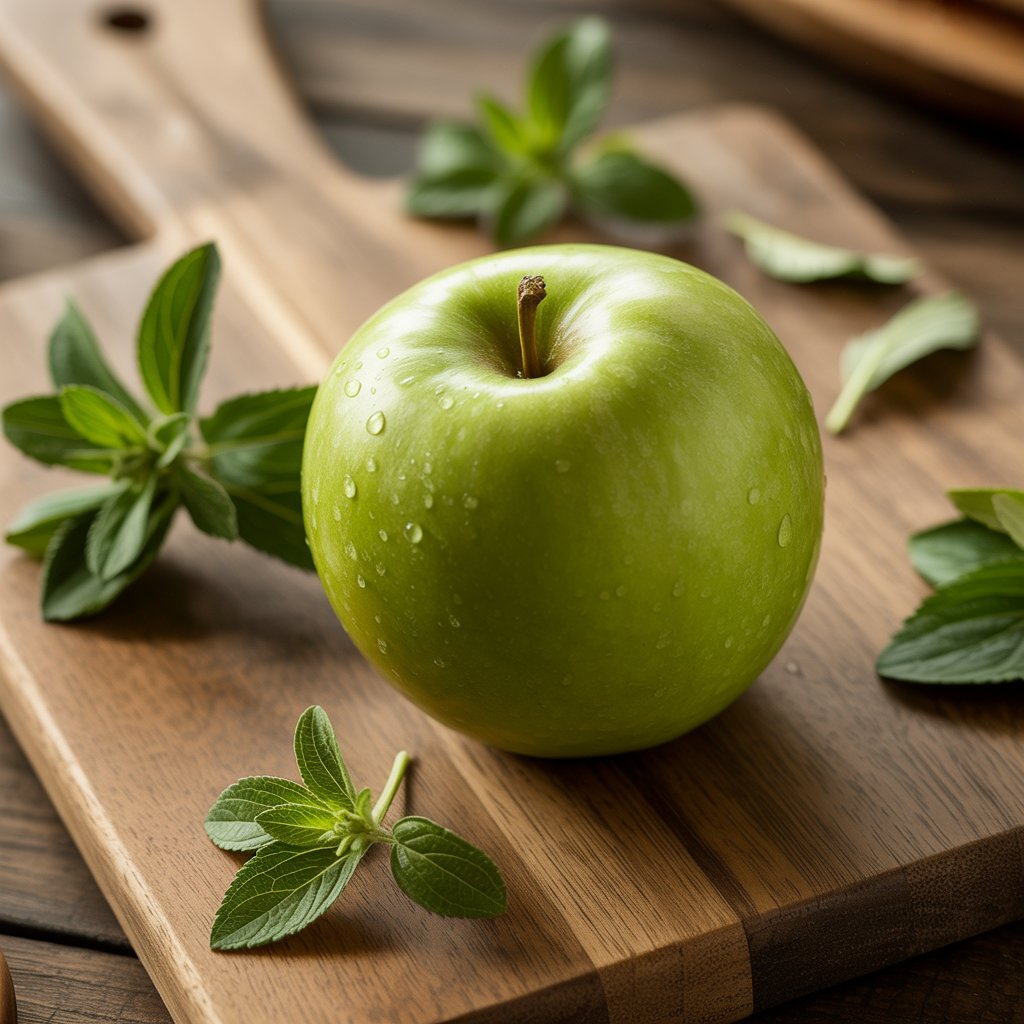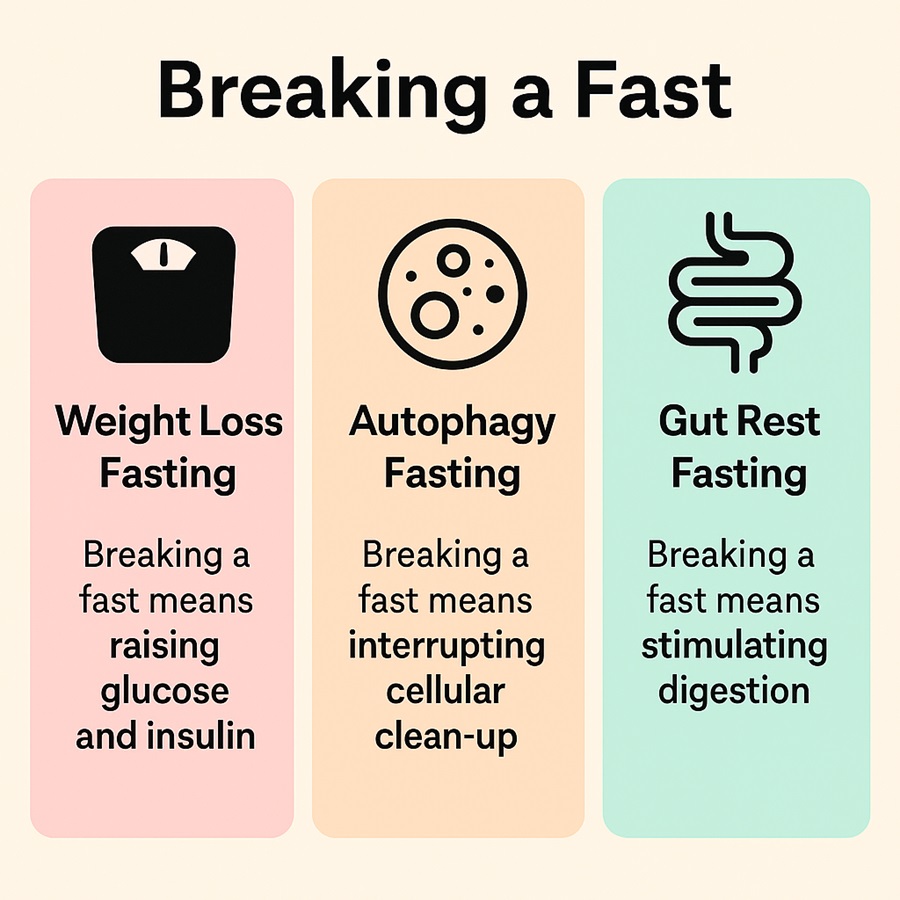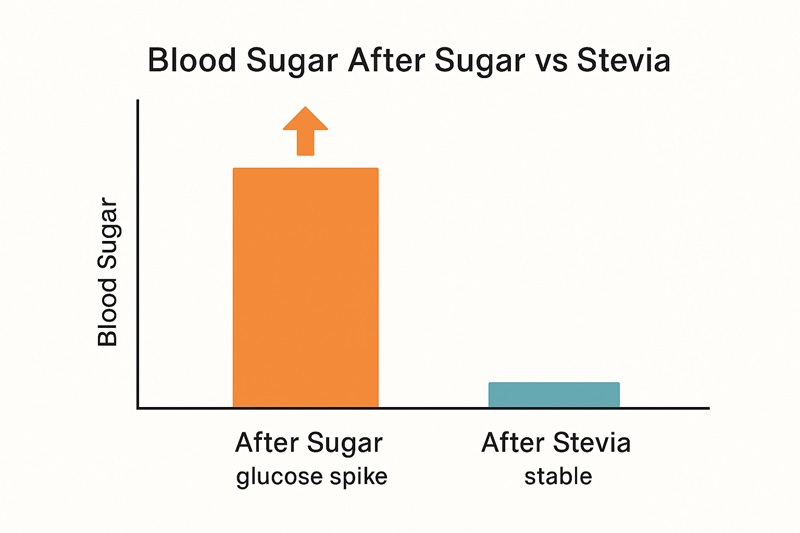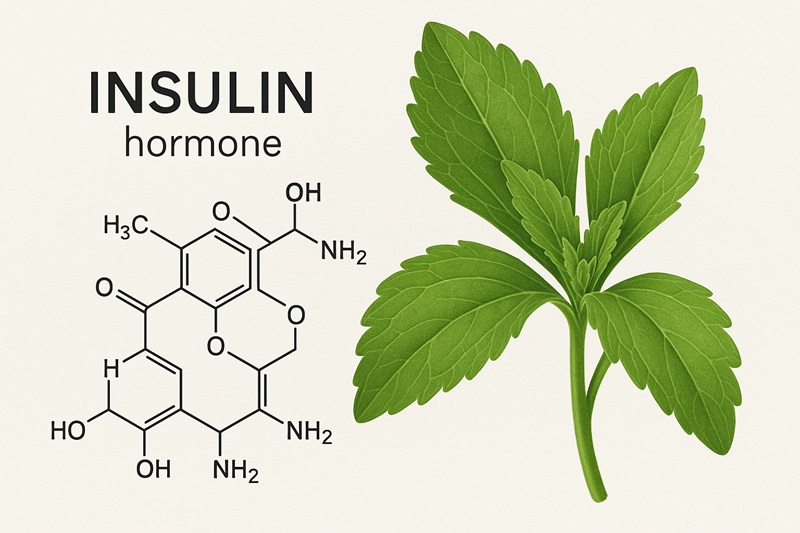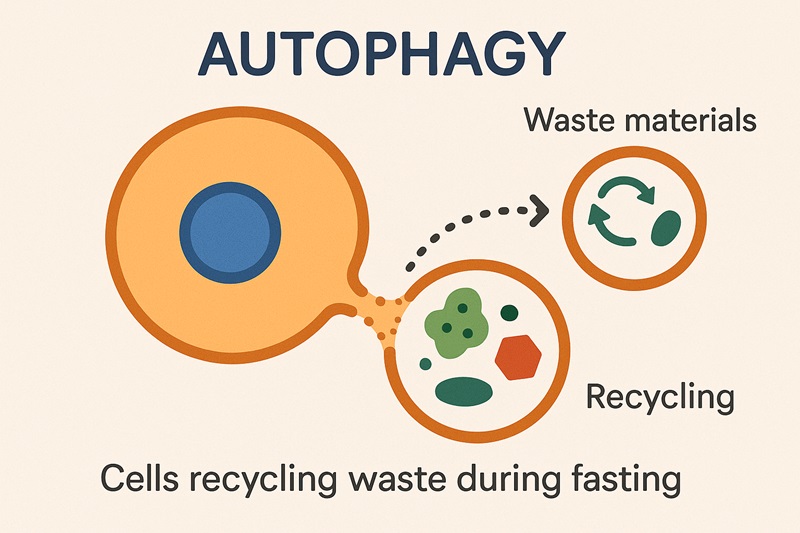Intermittent fasting has become one of the most popular approaches to weight loss and metabolic health. But when it comes to adding a little sweetness to coffee or tea, confusion often arises: does stevia break a fast?
The answer isn’t the same for everyone. It depends on your fasting goals — whether you’re trying to stabilize blood sugar, maximize fat burning, or encourage cellular repair through autophagy. This guide explores the science behind stevia’s effects on glycemic response, insulin, and autophagy, and explains how different fasting styles — from 16:8 to OMAD — may shape your choice.
Quick Answer
Does stevia break a fast?
Pure stevia does not break a fast for weight loss, blood sugar control, or ketosis. It contains no calories and does not raise glucose or insulin levels. However, if your fasting goal is maximum autophagy and longevity, the most cautious approach is to avoid all sweeteners, including stevia.
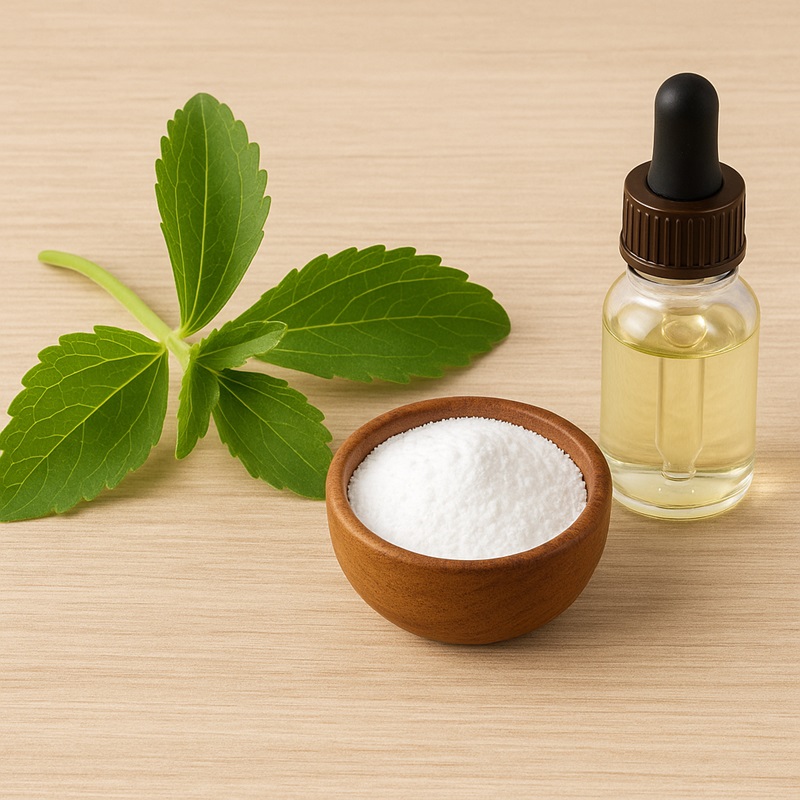
What Is Stevia and Why Do People Use It?
Stevia is a natural, plant-derived sweetener made from the leaves of Stevia rebaudiana, a shrub native to South America. Unlike sugar, it has no calories and is 200–300 times sweeter by weight, which means just a drop or pinch can transform the taste of a drink or recipe.
People turn to stevia for many reasons. Dieters often use it to cut sugar without giving up sweet flavors. Those with diabetes may choose stevia because it doesn’t raise blood sugar. It’s also popular in the keto community, where carbs must be tightly controlled, and among fasters who want to sweeten black coffee or tea without technically “eating.” Even dentists point out that stevia doesn’t feed oral bacteria in the way sugar does, making it tooth-friendly.
Commercial Forms of Stevia
Stevia isn’t always sold in the same way, and this matters when it comes to fasting.
- Pure extracts (liquid drops or powder): These are the best choice for fasting since they contain no fillers or hidden calories.
- Blends with sugar alcohols (erythritol, xylitol): Common in keto baking products. Usually safe for fasting, though large amounts can upset digestion.
- Packets with fillers (dextrose, maltodextrin): Often the cheapest supermarket options. These can raise blood sugar and technically break a fast.
- Flavored syrups or drops: May contain additives or small amounts of calories. Labels must be checked carefully.
When in doubt, stick with pure liquid stevia extract for the cleanest fasting experience.
What Does It Mean to “Break a Fast”?
The phrase “breaking a fast” can mean different things depending on why you are fasting:
- Metabolic fasting (weight loss, blood sugar control): You break the fast when you consume calories that trigger a rise in glucose or insulin.
- Autophagy fasting (cellular repair, longevity): You break the fast when you consume anything that could interfere with cellular cleanup.
- Gut rest fasting (digestive reset, gut health): You break the fast if you ingest anything that stimulates digestion.
Because stevia is non-caloric, it does not break a fast for metabolic purposes. For stricter goals like autophagy, some experts recommend avoiding it anyway.
Stevia and Blood Sugar (Glycemic Response)
One of the main benefits of fasting is improved blood sugar control. Research shows that stevia has a glycemic index of zero, meaning it does not cause a rise in blood glucose.
A 2010 study in Appetite compared stevia with both sugar and aspartame, finding that stevia lowered post-meal insulin and glucose. Similarly, trials in people with type 2 diabetes have shown that stevia may improve glucose tolerance over time.
In practical terms, this means you can use pure stevia in your morning coffee or tea without worrying about breaking a fast for glycemic control. Unlike sugar, it won’t cause a spike followed by a crash.
Stevia and Insulin Response
Another key concern for fasters is insulin. Some rodent studies suggested stevia might stimulate insulin release, but most human trials show minimal to no effect. A 2019 review in Nutrients concluded that stevia is essentially neutral when it comes to insulin secretion in healthy adults.
For people fasting primarily to burn fat or manage insulin resistance, this is good news. Any effect stevia has on insulin is too small to interfere with fat burning or ketosis.
Stevia and Autophagy
Autophagy — the body’s process of breaking down and recycling old or damaged cells — is one of the most exciting areas of fasting research. Unfortunately, there are no direct human studies on stevia and autophagy.
Because autophagy is highly sensitive to nutrient signals, some experts suggest avoiding all sweeteners if your fasting goal is maximum cellular repair. Others argue that because stevia has no calories and no known effect on nutrient-sensing pathways, it’s unlikely to interfere.
For now, the cautious approach is:
- Everyday intermittent fasting: Stevia is safe.
- Strict longevity fasts (48–72 hours): Stick with plain water, black coffee, or unsweetened tea.
Fasting Goals vs. Stevia Impact
Not all fasts have the same purpose. Some people fast to shed weight, others to improve blood sugar, and others to unlock longevity benefits through autophagy. Whether stevia “breaks” your fast depends on what you’re hoping to achieve.
For weight loss, stevia is a safe companion. It contains no calories, doesn’t block fat burning, and may even help reduce cravings. If your goal is blood sugar stability or improved insulin sensitivity, stevia is also considered fasting-friendly since it has a glycemic index of zero and minimal effect on insulin.
The situation becomes more complex with autophagy fasts, where the aim is cellular repair. Because autophagy is highly sensitive, even calorie-free sweeteners may theoretically interfere. For strict longevity fasts, most experts recommend avoiding stevia altogether. The same goes for gut rest fasts — while pure extract is unlikely to stimulate digestion, blends with fillers like maltodextrin could.
If you’re combining keto and fasting, stevia remains one of the best options. It doesn’t affect ketosis, and it allows you to enjoy a touch of sweetness without derailing carb restriction.
Here’s a quick overview:
| Fasting Goal | Does Stevia Break It? | Why It Matters |
| Weight loss & fat burning | No — safe to use | No calories, no fat disruption |
| Blood sugar control | No — safe to use | Doesn’t raise glucose |
| Insulin sensitivity | No — safe to use | Minimal insulin impact |
| Autophagy (cell repair) | Maybe — best avoided | Cellular recycling is sensitive |
| Gut rest | Maybe — depends on form | Pure extract safe, blends risky |
| Keto + fasting | No — safe to use | Keeps ketosis intact |
Stevia is safe for most fasting goals, but if you’re fasting strictly for autophagy or gut repair, a clean fast without sweeteners is the safest path.
Pros and Cons of Using Stevia While Fasting
Pros:
- Zero calories, won’t break metabolic fast.
- Does not raise blood sugar or insulin.
- Helpful for curbing cravings and supporting compliance.
- Safe for people with diabetes and keto dieters.
Cons:
- May maintain preference for sweetness, making sugar cravings harder to reduce.
- Some commercial products include fillers that can raise glucose.
- Long-term effects on autophagy aren’t well studied.
- Overuse in blends may cause bloating or digestive upset.
How Stevia Plays Out in Real-World Fasting
In practice, most fasters use stevia in morning coffee or tea. This allows them to tolerate long fasting windows without hunger. For those focused on weight loss, it can be a useful crutch to stay consistent.
Diabetics often find it beneficial as well, since stevia provides sweetness without destabilizing blood sugar. For longer water fasts (24–72 hours), stevia use becomes more controversial. Purists who want the full autophagy benefit usually avoid it, while those fasting mainly for fat loss may still include it without issue.
Does Stevia Break a Fast on OMAD, 16:8, or 5:2?
Different fasting schedules don’t change how stevia interacts with the body — but they do shape how people use it.
- OMAD (One Meal a Day): Since you fast for 23 hours, most people prefer plain coffee or tea. Pure stevia is safe, but those fasting for autophagy may skip it.
- 16:8 Intermittent Fasting: The most common style. Stevia in coffee or tea is perfectly fine here and doesn’t compromise the fast.
- 5:2 Diet: On low-calorie days, stevia adds flavor without adding calories, making it a good tool for adherence.
Across all three approaches, pure stevia doesn’t break a fast for weight loss or metabolic benefits.
Does Stevia Break a Fast on Keto? Myths, Facts, and Alternatives
Many keto dieters also practice fasting, which adds another layer of concern. A common myth is that all sweeteners kick you out of ketosis. In reality, pure stevia contains no carbs and does not impact blood sugar or insulin, so it doesn’t interfere with ketosis.
For those who want alternatives: monk fruit is another natural, non-caloric option. Erythritol, a sugar alcohol, is widely used in keto desserts and is generally safe, though some people experience digestive upset. For strict keto fasts, unsweetened black coffee or herbal tea remain the cleanest choices.
Stevia vs. Other Sweeteners During Fasting
| Sweetener | Calories | Glycemic Impact | Insulin Effect | Fasting-Safe? |
| Stevia | 0 | None | Minimal | ✅ Yes |
| Monk Fruit | 0 | None | Minimal | ✅ Yes |
| Sucralose | 0 | Possible gut impact | Mixed results | ⚠️ Maybe |
| Aspartame | 0 | Low | Mixed results | ⚠️ Maybe |
| Sugar | 16/tsp | High | High | ❌ No |
Takeaway: Stevia and monk fruit are the most reliable for fasting.
Scientific Studies on Stevia and Fasting
- Appetite (2010): Found that stevia lowered both insulin and glucose after meals compared to sugar.
- Journal of Nutrition (2016): Showed that long-term stevia use improved glucose regulation.
- Nutrients (2019, review): Concluded that stevia does not significantly stimulate insulin secretion in humans.
Together, these findings support stevia as a fasting-safe option for most people.
FAQs
Does stevia break a 16:8 fast?
No. Pure stevia won’t break a 16:8 fast aimed at weight loss or blood sugar control.
Can I use stevia in coffee while fasting?
Yes, if it’s pure stevia extract without fillers.
Does flavored stevia break a fast?
Possibly. Many flavored or powdered stevias include additives that can raise glucose.
How much stevia is safe during fasting?
1–2 servings daily is fine. Overuse may reinforce cravings.
Is stevia better than artificial sweeteners?
Yes. It’s natural, has no calories, and is less likely to disrupt insulin or gut health.
Conclusion
So, does stevia break a fast? For most fasters, the answer is no. Pure stevia does not raise blood sugar or insulin and can be safely used in coffee or tea.
- For weight loss, blood sugar management, and keto, stevia is fasting-friendly.
- For diabetics, it may even improve glucose control.
- For strict longevity fasts, the safest approach is to avoid all sweeteners.
The bottom line: if you stick with pure, filler-free stevia and use it in moderation, you can enjoy sweetness during your fast without losing the benefits.


